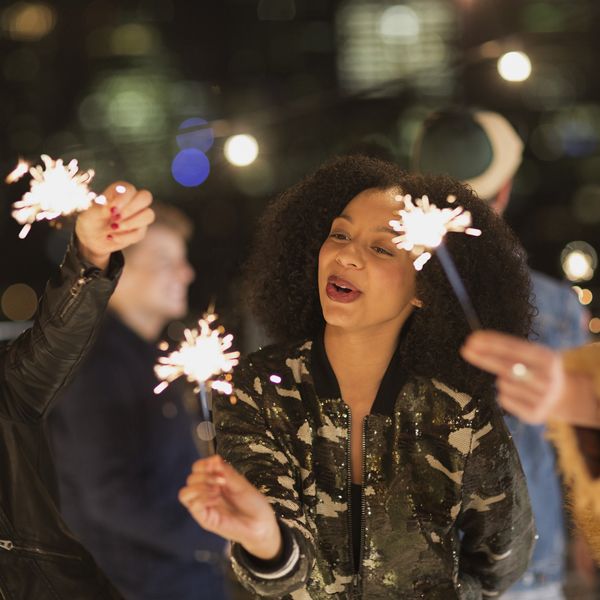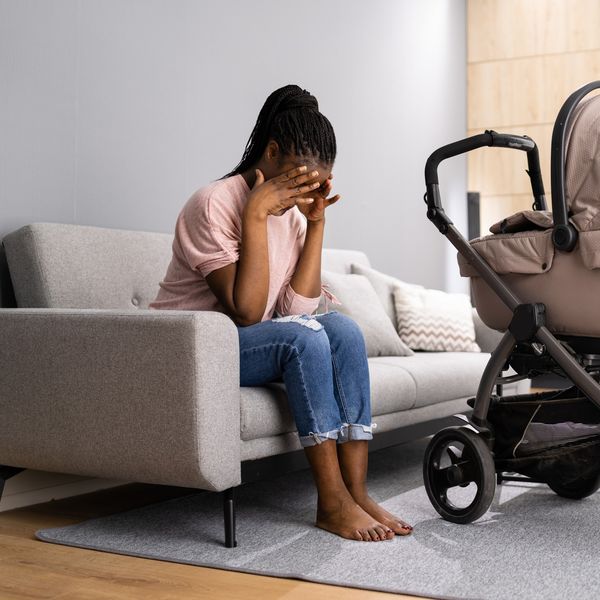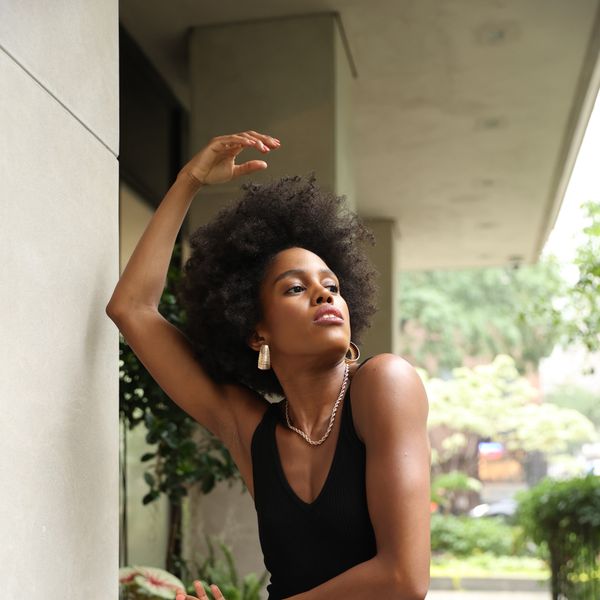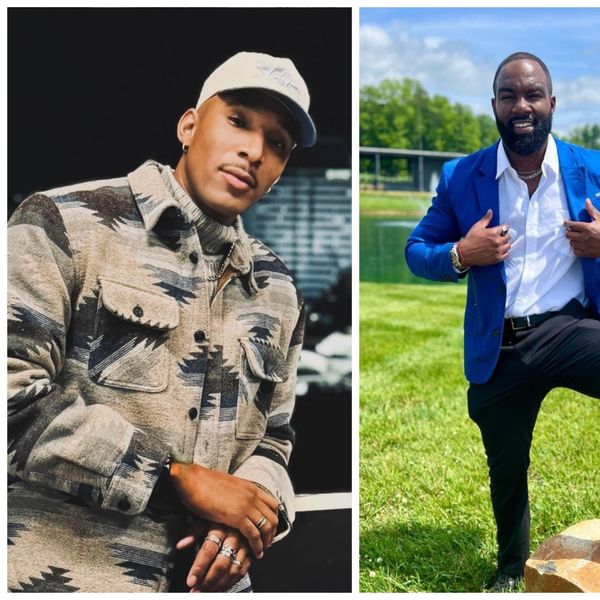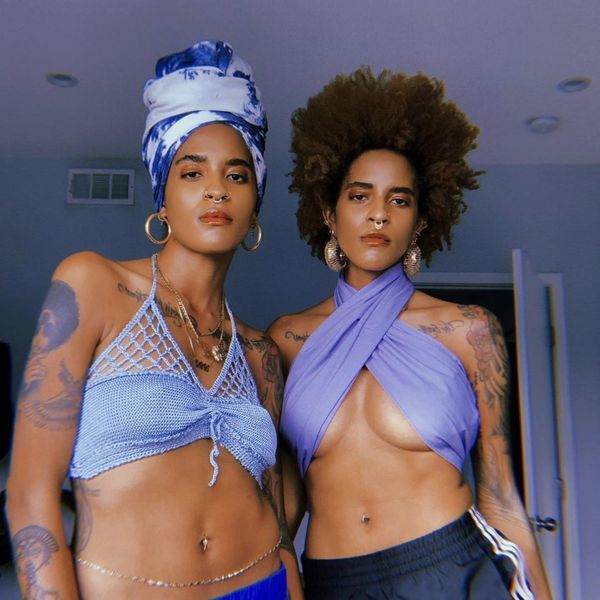
It's Pride Month, and what better time to highlight amazing Black LGBTQ leaders and advocates killing it in business? Yep, now is the perfect occasion. These entrepreneurs and executives are providing spaces for inclusion, disrupting and innovating in fashion, tech, entertainment, and finance, and giving voice to the struggles, issues, and vibrancy of LGBTQ communities. They are exemplary examples of brilliance we all can admire and take a nod from in our own lives both professionally and personally.
Check them out below:
Kierra Johnson, Executive Director of National LGBTQ Task Force
This power woman and mother is the first openly queer-identified Black woman to hold the position at the long-standing organization, and she's tasked with leading strategy to ensure equality and justice for LGBTQ people across the nation. The National LGBTQ Task Force works to fight against discrimination in housing, retirement, employment, healthcare, and more.
Kelsey Davis, CEO & Founder of CLLCTVE
Kelsey Davis was a creative professional who worked for major companies including Conde Nast and created content for brands including Coca-Cola before launching her own firm that provides services for matching freelance creatives with Generation Z brands. It's the creating real opportunities for other young creatives to get to the bag for us.
Lena Waithe, Co-founder of Hillman Grad Productions
If series like The Chi, Boomerang, Them, and Twenties, or films like Queen & Slim don't ring a bell, sis, you need to go ahead and pop from under that rock, subscribe to somebody's streaming service, and get caught up. Lena Waithe not only includes diverse depictions of LGBQT stories within her scripts, but she takes the advocacy further via the hiring practices and opportunities of Hillman Grad Productions.
Kiyanna Stewart and Jannah Handy, Co-founders of BLK MKT Village
This fab couple offers super-cool items that show just how rich and beautiful Black culture truly is, and they do it so stylishly. Together, Kiyanna Stewart and Jannah Handy lead their Brooklyn shop and online community of more than 280,000 followers, offering a well-edited selection of collectibles, apparel, and heirlooms that would put any museum curator to shame.
Ariell Johnson, Founder of Amalgam Comics and Coffeehouse
Ariell Johnson's North Philly shop offers an array of comics that put inclusion and representation at the forefront. From books and magazines to toys and figurines, she provides a special selection of items that ensure all lovers of the genre can find something to enjoy and be inspired by, and she unapologetically includes LGBTQ sci-fi "geeks" and comic enthusiasts in the all.
Natalie Patterson, Founder of Natalie Is Poetry
A self-proclaimed "teaching artist," Natalie Patterson fosters growth, compassion, and integrity via workshops, breakout sessions, performances and lectures. Her client roster includes brands like Sephora, Uproxx, and the United Way, and sis will have you deeply moved with her poetry. Trust.
Arlan Hamilton, Founder of Backstage Capital
As if surviving homelessness, living out of an airport and building a venture capital fund isn't impressive enough, Arlan Hamilton has spent the last six years raising millions of dollars to support more than 170 companies founded by female, minority and LGBTQ entrepreneurs. And get into this latest win: A recent crowdfunding effort reached its $5 million goal via more than 7,000 supporters. And that's just the tip of the iceberg. Way to get to that coin, sis!
Angelica Ross, Founder of TransTech Social Enterprises
Her company serves as an incubator to economically empower LGBTQ professionals and their allies by providing training for career skills. The platform particularly provides a forum for tools to fight against employment discrimination, and Angelica Ross, a self-taught programmer and actress known for her role on Pose as well as her work as a transgender rights activist, partners with brands and companies to foster training and employment opportunities.
Corianna and Brianna Dotson, Founders of Coco & Breezy
These savvy businesswomen have been giving twin-rock star-Black girl magic energy since 2009 with their eyewear brand, worn by celebrities including Beyonce, Prince, Rihanna, Alicia Keys, and Lady Gaga. As a brand, Coco & Breezy has since expanded into a luxury retreat venture, DJing, and visual art projects. They're also huge in LGBQT activism, lending their voices, art, and platform of more than 170,000 followers and supporters to issues of advocacy and rights protections.
Janelle Monae, CEO of Wondaland Arts Society
She's the soulful, ecclectic, tuxedo-wearing, boundary-pushing singer, producer and actress known for her roles in Hidden Figures, Moonlight, and Antebellum. Janelle Monae is also a fierce artist mentor, record label exec, and LGBTQ rights activist who has identified as pansexual and rides for equal rights and freedom of expression for all. Word to Django Jane.
Featured image via Coco and Breezy/Instagram
Your December 2025 Monthly Horoscopes Are All About Surrender & Alignment
December is about letting go. We end the year with the need for more peace, reflection, and rejuvenation, and that is exactly what December is providing for us. The Sun is in Sagittarius, and anything is possible. This is the month to believe in that and to know that the universe is supporting you. With a Supermoon in Gemini as we begin the month as well, we have an opportunity to gain the closure we have been looking for this year and to wrap up old projects, ideas, and communication breakthroughs.
This is the month to make your peace the priority and let go of trying to control the way the tides are turning. Trust in your new beginning, and give yourself time to prepare for it this month.
A big part of the clarity that is coming through this month is due to Neptune going direct in Pisces on December 10, after being retrograde here since July. With Neptune now direct, we are able to see our inspiration and creativity a little more clearly, providing the perfect energy for dreams and manifestation to be built upon. The smoke is clearing, and it’s up to you to decide what you want to do with this newfound clarity that this transit is bringing. Mercury also moves back into Sagittarius on December 11, which is great for communication and clarity, and the adventures you were trying to see through at the beginning of November come around for you again with greater purpose and support.
On December 15, Mars enters Capricorn until the end of January 2026, and this is the extra push we need to make important changes and to be on the path towards greater abundance, stability, and prosperity. Mars in Capricorn takes care of business, and we have extra energy at our disposal during this time to do so. This transit is an ideal time to focus on your career or financial goals for next year and to start putting some of these plans into motion now. A few days later, we have the New Moon of the month, which will be in Sagittarius on December 19, and this is the perfect New Moon to manifest.
The energy is high, magic is in the air, and it’s all about moving forward with the new beginnings that are inspiring you and bringing you joy to think about right now.
Capricorn Season officially begins on December 21, and this earth sign energy is how we heal, gain closure, and build new foundations in our world. With Venus also moving into a Capricorn a few days later, there is something about peace, prosperity, and security that we are gaining in life and in love as we close out the year, and this is what we need right now. This month is about reflecting on what was, letting go of old hurt, and renewing. December is an ending and a new beginning in one, and there is magic in this space to be created.
Read for your sun and rising sign below to see what December 2025 has in store for you.
 AriesKyra Jay for xoNecole
AriesKyra Jay for xoNecoleARIES
December is a full-circle moment for you, Aries. You are seeing the gifts in your world and have a lot of gratitude for the way things have come about for you as of late. There are culminations in your world that are providing you with more abundance, stability, and community, and you are exactly where you are meant to be this month. With the Sun in a fellow fire sign and in your 9th house of travel for most of the month, December is a good time to get out of your comfort zone, explore the world around you, and get your body moving.
Mars, your ruling planet, also makes a change and moves into Capricorn on December 15, which will fuel your inspiration and power in your career space. You are making a lot of professional progress as we close out the year; however, make sure to be more mindful of your competitive drive right now. The New Moon on December 19 is the perfect opportunity for you to create some new plans and goals when it comes to traveling, education, and where you want to gain some new inspiration in your world. Overall, this is a month of things coming together for you serendipitously.
 TaurusKyra Jay for xoNecole
TaurusKyra Jay for xoNecoleTAURUS
December is about trusting your intuition, Taurus. You have a lot on your mind this month, and it’s best to delegate, communicate, and allow yourself some relief by opening up to someone and not feeling like you have to hold everything in. As we begin the month, we have a Supermoon in Gemini happening in your house of income, and the plans and projects you have been building here come to fruition for you now. This is the time to gain clarity on your financial world and to take a look at what spending habits you want to let go of here as well.
With Venus in your 8th house of shared resources for most of the month, you are doing a cleanse on your commitments, partnerships, and business ventures. You are taking a look at what you want to dedicate yourself to in the future, and what commitments you may need to let go of now in order to be in the space you truly want to be, both financially and within some of your relationship dynamics. Before we end the month, we have a New Moon in this same area of your chart, and it’s time to look at the opportunities that are presenting themselves and to trust your internal guidance system to lead you forward.
 GeminiKyra Jay for xoNecole
GeminiKyra Jay for xoNecoleGEMINI
You are moving forward fearlessly this month, Gemini. December is your month of love, passion, and dignity, and you are owning the light that you shine. We begin the month with the last Supermoon of the year, happening in your sign, and you are stepping up to the plate. You are showing up, owning how much you have grown this year, and allowing yourself to heal while also acknowledging that you have done your best and you deserve to have fun in the midst of the changes you are creating.
Mercury, your ruling planet, is officially out of retrograde, and you can use this energy to the fullest potential now. With Mercury in your 7th house of love, it’s time to speak from the heart and to talk about the things that matter and that are inspiring you right now to your loved ones. You never know what kind of epiphanies you may have when you open up the conversation to others. Before the month ends, you have a New Moon in this same love area of your chart, and this New Moon is all about manifesting romance, commitment, and abundance in your world.
 CancerKyra Jay for xoNecole
CancerKyra Jay for xoNecoleCANCER
December is an opening for more love, more joy, and more freedom in your life, Cancer. You have come to a place where you hold so much gratitude in your heart for where you are today and where your heart is shining, and things come together for you with more ease right now. With the Sun in your 6th house of health, work, and daily routines for most of the month, you are getting your ducks in a row while also putting more energy and effort into taking care of yourself, your priorities, and your well-being. This month surprises you in many ways, and it’s because you are showing up.
Mars and Venus both move into your house of love, relationships, marriage, and abundance this month, and you are making strides in your love life. You have both of these opposing forces on your side and are being recognized for the love you are while also receiving the love you want. This month, overall, is about focusing more on the positives in your world and letting your heart have its joy. Before December comes to an end, there is a New Moon in Sagittarius, and this is the perfect opportunity to create the plans you want to see through next year, especially when it comes to your work life, colleagues, business ventures, and health.
 LeoKyra Jay for xoNecole
LeoKyra Jay for xoNecoleLEO
The scales of karma are balancing, and they are balancing in your favor this month, Leo. December is your month of truth, and of seeing it clearly in your world. The Sun is in your house of romance, pleasure, and happiness for most of the month, and it’s time to relax, be in the present moment, and allow what is meant to be, to be. With a Supermoon in your 11th house of manifestation as December begins, this is a powerful month for seeing your dreams come to fruition, and for feeling like the intentions you have set this year are finally here for you now.
Mars also moves into your 6th house mid-month, and this is the perfect energy to have to move into the new year. You have extra energy at your disposal right now and are feeling fearless with what is possible for you and your daily routine. Before the month ends, we also have a New Moon in a fellow fire sign, Sagittarius, and this is a breakthrough moment for you and your heart. December, overall, wants to show you how loved and supported you are and will be doing so in magical, unexpected, and concrete ways.
 VirgoKyra Jay for xoNecole
VirgoKyra Jay for xoNecoleVIRGO
December is a month of victory, Virgo. You are showing up and experiencing some new successes in your world that move you forward on your path in life. With a Supermoon in your 10th house of career as we begin the month, the effort and intentions you have made this year come into full bloom, and you are being recognized for who you are and the good work you have done. This month is all about showing up and allowing yourself to be seen and loved, knowing that you deserve the support and opportunities you are receiving.
Mars moves into Capricorn on December 15, which brings the passion and excitement into your love life, hobbies, and little pleasures in life that light you up. You want to have fun this month and are going to be walking into the new year with this fearless, happy, and spontaneous energy within you. Before the month ends, Venus also enters Capricorn, and in this same area of your chart, you have a lot to look forward to and believe in right now. Overall, December wants you to be happy and will be doing everything possible to make that happen for you. This is your month to shine, Virgo.
 LibraKyra Jay for xoNecole
LibraKyra Jay for xoNecoleLIBRA
December is a month of opportunity for you, Libra. New doors open, and you are financially making breakthroughs this month because of it. December begins with a Supermoon in your 9th house, and you are getting a clearer view of where you have been making strides in your life and how it has all brought you here to this present moment of freedom. This month is showing you what happens when you are fearless with your purpose and when you believe in yourself and what you are worthy of.
Moving further into December, Mars moves into your 4th house of home and family mid-month, and you are closing out the year in your safe spaces. You are spending more time with your loved ones and taking the time to quiet your mind and listen to what your heart has been telling you. Before the month ends, we have a New Moon in Sagittarius, happening in an area of your life that deals with communication. This is a great time for getting the answers you have been looking for and for feeling more clear-headed and confident about the decisions you are making as you move into the new year.
 ScorpioKyra Jay for xoNecole
ScorpioKyra Jay for xoNecoleSCORPIO
Patience is a virtue this month, Scorpio. December is all about remaining patient and vigilant with what you are creating in your world, and knowing that the universe has your back. It’s time to be reminded of the power of hope, and this month is an opening to greater clarity in your life. There is a lot of energy in your financial zones right now, and this is providing you with new opportunities and new insight; however, the speed at which things come about for you may feel daunting. Keep your head up and eyes focused on what you want and know that you are more than worthy of receiving it.
With Mercury in your 2nd house of income this month, December is a good time to plant new seeds and to think about where you want to be financially a month from now or even a year. This month is asking you to think bigger and to think more long-term so that you can set the appropriate plans into motion now. We also have a New Moon in your house of income before the month ends, and this is when you will see more of your dreams come to fruition in this area of your life, and have more opportunities to build. Overall, December will be teaching you a lot, Scorpio.
 SagittariusKyra Jay for xoNecole
SagittariusKyra Jay for xoNecoleSAGITTARIUS
Sagittarius Season is here, and there is a lot in store for you this month, Sag. December is all about what you are dedicating yourself to. It’s about setting your intentions and putting the work in to back up your dreams, and about getting things in order so that when the new beginnings come, you are ready for them. The Sun and Venus are in your sign for most of this month, and there are a lot of eyes on you right now. You have the potential to create a new beginning for yourself, and it’s time to invest in yourself, your love life, and your dreams.
Mercury moves into Sagittarius on December 11, and this is giving you another opportunity to see through some of the plans that you had initiated in November. Mercury was retrograde in your sign last month, and there may have been some disruptions to your vision and plans for the future, and now this energy is turning around for you. Before the month ends, we also have a New Moon in Sagittarius, and you are walking through new doors fearlessly. You are catching others by surprise by your growth this month, and you are thinking a lot about your purpose, future, and plans for the new year.
 CapricornKyra Jay for xoNecole
CapricornKyra Jay for xoNecoleCAPRICORN
December is all about the vision, Capricorn. You are moving through a lot of changes and transformations this month, yet they are giving you a chance at a new beginning in the process. You are focused more on the future and what goals you want to manifest for yourself right now, and are ready to let go of what hasn’t been working for you. With the Sun in your 12th house of closure for most of December, this is your time for healing, but remember, healing doesn’t have to be isolating or boring; you can thrive while you renew, and you are this month.
Mid-month, the excitement picks up for you, and you are feeling more energized than you have in a while. Mars moves into Capricorn until the end of January 2026, and you are being proactive with your goals, intentions, and passions. You are a force to be reckoned with this month, and you are making things happen for yourself with confidence. Capricorn Season officially begins on December 21 this year, and this is definitely speeding up your healing process. You are breaking free from what was, and with Venus also moving into Capricorn before the month ends, you are leaving this year in high spirits and with love opening a new door for you.
 AquariusKyra Jay for xoNecole
AquariusKyra Jay for xoNecoleAQUARIUS
December is all about community, creativity, and manifestation, Aquarius. This is the month to work together with others to help bring your dreams to life. You are in a space of inspiration, empowerment, and beauty, and are creating more of this energy around you and in your world. Look out for what support comes your way this month and know that you don’t have to do everything alone to succeed. With the Sun in your 11th house of manifestation and friendship, your intentions are coming to fruition, and it’s time to celebrate with the people you love and to own how far you have come this year.
On December 19, we have a New Moon in Sagittarius, lighting up your life in all of the best ways possible. This is your New Moon of freedom, victory, and magic, and you are seeing new beginnings appear that you were once just hoping for. Before the month comes to an end, Venus moves into your 12th house of closure, and after an active and successful month, you are ready to relax, heal, and give your heart some of the attention it has been asking for. You are moving into the new year with the need to release and renew what hasn’t been working in your relationships, and you are finally ready to.
 PiscesKyra Jay for xoNecole
PiscesKyra Jay for xoNecolePISCES
December is a big month for you, Pisces. You are making some huge accomplishments this month, and are feeling like everything you have been through this year has been worth it for these moments that are coming to fruition for you now. The Sun is in your 10th house of career and reputation for most of the month, and this is where a lot of your focus is right now. You are claiming your successes and putting yourself out there in ways that not only serve you, but that inspire others as well.
Neptune officially goes direct on December 10, after being retrograde in your sign since July, and you are finally seeing things a little more clearly. You are feeling renewed inspiration and passion in your life, and your intuition is your strongest asset right now. Before December comes to an end, we also have a New Moon in your 10th house of career, and what happens now not only changes things for you in the present, but it also opens new doors and what is possible for you in the new year as well. Overall, you are on top of your game this month and are owning the joy and empowerment you feel.
Featured image by Kyra Jay for xoNecole
Why The Cayman Islands Is The Ideal Soft-Life Island-Hopping Destination
It's always a pleasure to add a new stamp to the passport, especially when it's an opportunity to visit a country you've never been to. When invited to explore the Cayman Islands, I was very familiar with Grand Cayman—the largest among the three islands, known for its stunning clear-blue beaches, and modern city comforts—but I seriously slept on Cayman Brac.
On a six-day trip, I knew Grand Cayman would be that girl, but the smaller sister island Cayman Brac? She’s the captivating, low-key spot that is a whole soft-life fantasy.
This trip was my first time in the destination, via the Cayman Islands Department of Tourism (@visitcaymanislands) and it had all the luxe chill and exploration that makes for great memories that will prompt anybody to want to return again and again. Plus, it was the tail end of rainy season, which is basically my jam because off-peak travel makes me feel like a VIP. I get the beauty, the beaches, the food, the people—without the crowds and noise.
Let’s get into how you can pack your Cayman Islands itinerary with cultural exploration, elevated cuisine, deep restoration, and an island-hopping adventure along the way.
GRAND CAYMAN
Grand Cayman hits you with that effortless island confidence from the moment you land. It’s the largest of the Cayman Islands, known for crystal-clear Caribbean waters and a culture that blends British influence with laid-back island charm.
Visitors pull up for Seven Mile Beach, stingray encounters, fresh seafood, and those luxe resorts and villas that make unplugging way too easy.
Where To Stay

Courtesy/Grand Cayman Marriott Resort
Grand Cayman Marriott Resort: This property offers ocean views, polished comfort, with easy access to everything near Seven Mile Beach. (Marriott stays are often a go-to for me when I’m in the mood for a resort stay where the standards are consistent no matter the destination).
The spacious rooms, warm staff, and a pool area perfect for quick resets between adventures were a hit for me. Despite the patchy rain, lounging by the pool felt like a reset button.
I popped into the gift shop and found pieces from Isy B, the Cayman-based brand created by Isy Obi, a Black woman who pivoted from finance to fashion. The designs are bold, colorful, full of vibes I love to reference when returning home.
Botanica Luxury Cottages: The cluster boutique cottages blend island-chic décor with modern touches. My cabin had vaulted ceilings, washer and dryer, roomy showers, a cozy lounge area, and a private outdoor nook with stylish umbrellas and seating perfect for reading, sunbathing, or unwinding. A pool is just a short walk away on the property and Seven Mile Beach was just a quick drive. I took a two-mile stroll along the shoreline where families, chilled-out tourists, and sleek beach clubs lended to a balanced and laid-back but lively environment.
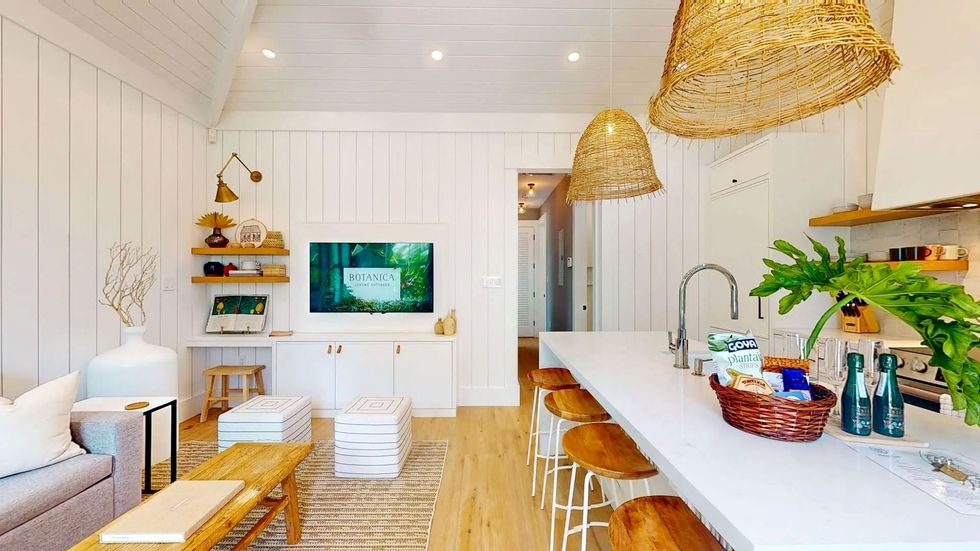
Courtesy/Botanica Luxury Cottages
Where To Eat
Pom Pom: This breezy rooftop lounge serving curated cocktails with a relaxed, stylish vibe and mellow music was the perfect evening welcome to the island. And the sunsets are divine.
Avecita Chef’s Table: It’s an amazing multi-course dining experience where chefs craft global flavor fusions right in front of you. Expect bubbles, bold tastes, and an ambiance that feels refined without being pretentious. This is one experience I definitely plan to fly back to Cayman for in the new year.
Pepper’s Bar & Grill: Conveniently located just across the street from the resort, it’s a local casual spot with live music and unique takes on Caribbean meal staples. The Cayman-style jerk pork was a favorite.
Ristorante Pappagallo: Set on a 14-acre bird sanctuary overlooking a saltwater lagoon, this brunch delivered everything from sushi to risotto to curry goat to barbacoa tacos. The white tablecloth elegance paired with homestyle warmth and peaceful water views made the whole experience feel elevated yet comforting.Bacaro
Bacaro: This is where we had our farewell dinner, enjoying their Venetian-inspired small plates and curated cocktails. If you want a final night with your partner or even your best girl group, this is the spot.
Things To Do:

Courtesy/Island Soul
Floating Sound Bath with Island Soul: The floating meditation was calming, grounding, and deeply restorative. We had the sky and breeze as a backdrop and listened to music, prompts and chimes that allowed us to simply float and be.
Anchor & Den Cocktail Class at the Grand Cayman Marriott Resort: I thoroughly enjoyed this lively, hands-on cocktail-making session which would be fun for couples, friends, or anyone wanting a playful evening activity without leaving the property.
The Grove: This is a foodie and art-lover's delight with its dining and culture scene that features spots like Island Naturals, a chill café with plant-forward dishes—where the mushroom tacos were everything, and the tuna poke nachos are a must—and upscale spots like Mykonos Steak Club. After eating, stop by Carlos Garcia’s gallery, a working studio and public exhibition space that supports a collective of local and international artists, and regularly hosts events, pop-ups, and live painting.
Pirates Week Festival: This was a welcome surprise addition to our itinerary, and it's an event held in November across the Cayman Islands, with the major events happening in the heart of Grand Cayman's George Town. During the finale, I was out there jumping and whining to Nessa Preppy and Faith Callender, rum in hand, surrounded by locals and pure island joy. As a woman who loves soca, that moment lit me up. It was the perfect last hurrah with a slice of home, culture, and celebration.
Bonny Moon Beach Club: It’s a Tik Tok-famous stylish beachfront lounge experience that, for me, actually matched the good reviews. The octopus ceviche and everything from the woodfired portion of the menu were a hit and the DJ added the right amount of energy. We ate just steps from the ocean. It's swanky, atmospheric, and ideal for date night, girls’ trips, or baecations.
CAYMAN BRAC
Known for dramatic limestone cliffs, caves, and some of the best diving in the Caribbean, the vibe in Cayman Brac is slower, more local, and perfect if you want nature, real island culture, and adventure without the crowds. I took a quick Cayman Airways flight from Grand Cayman and spent two days there.
The visit was honestly one of the most peaceful, soul-nourishing parts of my trip. The moment I landed, the island reeled me in—raw, mysterious, almost cinematic in its quiet beauty. There’s a softness that feels like an alluring secret.
Where to Stay

Courtesy/Le Soleil d'Or
Le Soleil d’Or: This is a farm-focused boutique haven with luxury villas, a restaurant, a pool, and its own beach club. Our villa was huge, complete with a kitchen, living room, laundry space, game room, and the modern luxury master suite of my dreams.
The bathroom had a soaking tub that fit my 5’7"-plus frame, a large shower, and his-and-her sinks. The bedroom had tons of storage, a large comfy bed, and a mini fridge, plus a TV lounge and veranda opening to the pool. Honestly, my suite could’ve been a full studio apartment back home—I was blown away.
The farm-to-table meals, which I could enjoy at the restaurant just steps away from my suite, were rich, fresh, and soulful. My morning walks on the property were serene, wrapped in nothing but nature and quiet.
If you want an escape from the tourist and business buzz of Grand Cayman, this is the perfect hideaway for a baecation, girls trip, or solo venture.

Courtesy/Le Soleil D'Or
Things To Do & Good Eats
Rock Iguana Yoga: This soothing yoga and therapeutic art experience was set in lush island terrain and was a grounding, earthy immersion that eased my back pain from stress, and was a great quiet time to reflect and release. The instructor was patient, graceful, and welcoming.
Le Soleil D’Or Beach Club: It's a chill open beachfront that offers a peaceful, quiet experience in the off season. Think serene solitude, gentle waves, and open space to unwind—far from the typical beach club scene with loud DJs, pumping music, and high-energy crowds.
Star Island Restaurant: This restaurant reminded me of my favorite local spots in Jamaica where you can get food with spices and tastes like your Caribbean grandma or auntie made the meals with love. The menu includes Caribbean dishes like jerk chicken and Cayman's national dish, stewed turtle.
I’ve been to several islands across the Caribbean—with my tried-and-true all-time favorite being Jamaica—and I must say, if you want that soft-life island-hopping luxury adventure paired with opportunities to connect with a rich arts, music, and culinary scene, a trip to the Cayman Islands is exactly that.
Featured image via Shutterstock



